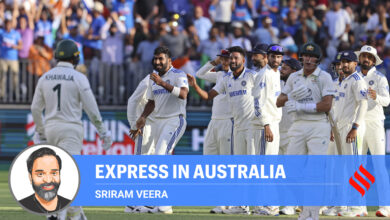74% players rate Test cricket most important; 49% would reject national contract in favour of bigger T20 purse

Cricket believes in numbers. And as the Federation of International Cricketers Association came out with its global employment report on Tuesday, the message is loud and clear. Out of the 400 men’s players across 11 countries (excluding Indians) who were surveyed FICA, 49 per cent have revealed that they would consider rejecting a national contract in favour of a bigger domestic T20 contract as international cricket grapples with fear of losing the top players to franchise system.
While there is more and more inclination towards T20 franchise cricket, 74 per cent still rate Test cricket as the most important to play in. But it has reduced from 82 per cent in the previous survey. And the day-night Tests seem to have become hugely popular among cricketers with 79 per cent giving a thumbs up to it.
Although there have been widespread calls to convert Test cricket to four days as it could free up the international calendar, 56 per cent of players are against such a decision as they want to preserve the long format. However, 63 per cent of the players want the International Cricket Council and the member boards to have a separate window for international cricket and T20 leagues.
South Africa’s captain Dean Elgar, centre, celebrates with his players as they win the match an innings and 12 runs on the third day of the test match between England and South Africa at Lord’s cricket ground in London. (AP)
And even though the number of T20Is is increasing every year, it is the 50-over World Cup that 54 per cent feel is the pinnacle ICC event. However, the number has reduced from 86 per cent from the previous survey conducted in 2019/20.
These numbers are not surprising. In the cover page of the report, there is Ben Stokes making a substantial point about the current cricketing landscape which is crowded with international and T20 cricket. “Three formats are unsustainable for my body right now. I feel my body is letting me down because of the schedule and what is expected of us,” says Stokes, who has already retired from 50-over cricket.
Then there is Trent Boult, the New Zealand seamer, who has declined the central contract offered New Zealand Cricket in favour of T20 leagues, saying, “If I don’t play international cricket, then that might be a couple of T20 leagues a year and 10 months at home rather than the other way around.”
New Zealand’s Trent Boult reacts during the T20 World Cup cricket semifinal between New Zealand and Pakan in Sydney, Australia. (AP)
Considering the previous 50 over World Cup in England turned into a huge success, the drop in numbers is surprising. But the T20 World Cups have showed there is space for more upsets and the bridge between the full members and Associates is getting narrow in T20s because players get an opportunity to play in domestic leagues.
While news of players preferring domestic T20 contracts in favour of national contracts will be seen as unhealthy for international cricket, there is another context that needs to be looked at. 69 per cent of players have just one year left in their national contract and nearly 50 per cent of the players feel insecure about their employment. In that sense, the T20 contracts offered multiple domestic leagues are multi-year ones and are lucrative for players.
Balance in formats
In view of these issues, the FICA wants the ICC and the member boards to have a balanced global structure so that all the major events – the ICC events, international bilaterals and T20 domestic leagues – can co-ex. “The majority of the value in each of the three majors, revenue generating cricket landscapes, is generated through a small number of players, and those players can only be in so many places at once. Whilst FICA does not have all the answers, and acknowledges the challenges associated with scheduling, we continue to advocate for: a balanced global structure for the game that enables the international cricket and leagues landscapes to co-ex; recognition of domestic leagues in the game’s global structure; and a clear framework around bilateral international cricket scheduling,” the report adds.
Gujarat Titans team held roadshow at Sabarmati Riverfront in Ahmedabad on Monday celebrating their victory in IPL cricket final. (Express photo Nirmal Harindran)
As this conflict leads to players choosing between international cricket and T20 leagues, the survey shows that 40% of the top T20 players in the world now do not have a central contract with a top nine cricket country. The other 42 per cent players are in hybrid market, where they have a national contract as well as domestic T20 contract. The remaining 18 per cent is made up of Indians, who rely totally on BCCI and revenue from domestic cricket as they are barred from playing in other T20 leagues.
In terms of international cricket volume, in the last three years, the number of T20 cricket matches has grown from 32 per cent in 2018 to 71 per cent in 2022. The ODIs, which accounted for 49 per cent of total international cricket volume have now gone down to just 19 per cent, increasing concerns of sustainability of the 50 over format in the long run. Test cricket has shrunk from 19 per cent in 2018 to 9 per cent in 2022.
On a grimmer note, 14 percent of those surveyed said they had been discriminated against based on race, with two thirds believing they didn’t receive adequate support after reporting discrimination.
***
Box
84 players turning out in multiple overseas T20 leagues
49% would consider rejecting a central contract if they were paid more to play in domestic leagues.
74% still rank Test cricket as most important format, although this has reduced form 82% from 2018/19 survey.
54% still consider the 50 over World Cup as the pinnacle ICC event, although this has reduced significantly from 86% in the 2018/19 FICA survey.
69% have less than 12 months to run out on their current contract, while over half feel insecure or very insecure about their employment as a cricketer.
14% have been discriminated against based on race, with two-thirds believing they did not have adequate support provided afterwards.
84 the number of players playing for 2 or more overseas domestic league teams in 2021.
82% the percentage of players in the top 100 of the T20 Player Index who are now in the free agent or hybrid employment category.
44% of players don’t believe they have a clear say on player issues in the game.
58% of players felt tour/event protocols such as bio-secure bubbles negatively impacted their well being.
DOMESTIC LEAGUES WORKLOAD in 2021
No of matches and players
59 Glenn Phillips53 Rashid Khan51 Nicholas Pooran49 Shoaib Malik48 Mustafizur Rahman
***







